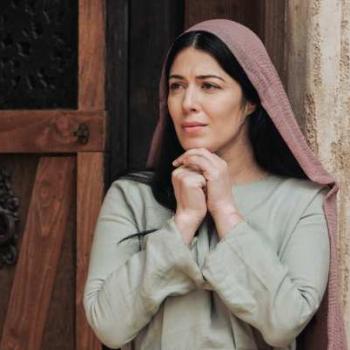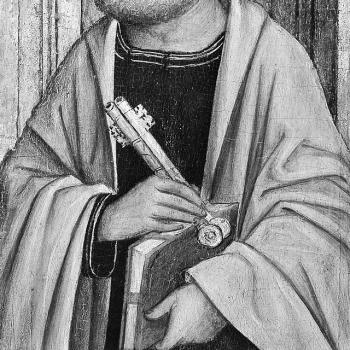Lectionary Reflections
John 1:1-18
January 5, 2014
Douglas V. Steere in his classic devotional book Doors into Life: Through Five Devotional Classics, devotes a chapter to Frances de Sales, a sixteenth century Catholic priest from Savoy. De Sales was a mission preacher, director of souls and, from 1602-1622, Bishop of Geneva. He is best remembered as the author of the practical, gracious guidebook to the spiritual life titled Introduction to the Devout Life. One of his recommendations about prayer was to end one's prayer period with a "spiritual bouquet" and to carry it through the day.
Francis put it this way: "Those who have been walking in a beautiful garden do not leave it willingly without taking with them four or five flowers in order to inhale their perfume and carry them about during the day." (Steere, 80-81, quoting Introduction to the Devout Life, 63-5)
Steere elaborates on Francis' little parable:
"When walking in a beautiful garden most people are wont to gather a few flowers as they go, which they keep, and enjoy their scent during the day. So, when the mind explores some mystery in meditation, it is well to pick out one or more points that have specially arrested the attention, and are most likely to be helpful to you through the day, and this should be done at once before quitting the subject of your meditation" (Steere, 81).
The context of this advice was the late sixteenth and early seventeenth centuries. The odor in city streets reeked of garbage and sewage. People really did carry bouquets, or what they referred to as "nosegays," to hold to their faces as an antidote to the stench.
After meditating on the Prologue to the Gospel of John, here are the spiritual flowers in the bouquet I will take with me into this new year. They take the form of three prayers of thanksgiving.
First, I give thanks that the light and life is intended for all people. The Prologue begins on a cosmic note with a reference to Creation. The author has chosen words and symbols with which people of varying backgrounds would resonate. Jews would be reminded of the Creation of God in Genesis and the Wisdom of God active in Creation in Proverbs 8. Greeks would understand the author to be referring to the creative principle of order in the universe understood as the Logos. I am grateful that the Word is a gift intended for everyone, not just for some.
The renowned nineteenth century Baptist preacher Charles Spurgeon, in a sermon on the Incarnation, expressed his gratitude for this gift in these words:
"GOD had made many visits to men (sic) before Christ's Incarnation, but the most wonderful, visit of all was when He came to tarry here, some three and thirty years, to work out our salvation. What but "tender mercy," hearty mercy, intense mercy, could bring the great God to visit us so closely that He actually assumed our nature? Kings may, for various reasons, visit their subjects; but they do not think of taking upon themselves their poverty, their sickness, or their sorrow. They could not if they would, and they would not if they could; but our Divine Lord, when He came hither, took upon Him our flesh.
O children, the Lord so visited you as to become a Babe, and then a Child, who dwelt with His parents, and was subject unto them, and grew in stature, as you must do! O working-men, the Lord so visited you as to become the carpenter's Son, and to know all about your toil, and your weariness, ay, even to hunger and faintness! O sons of men, Jesus Christ has so visited you that He has assumed your nature, and taken your sicknesses, and borne your infirmities, and your iniquities, too! This was a kind of visit such as none could have thought of making save our infinitely tender and merciful Savior. Christ Jesus, the God-man, is our next of kin, a Brother born for adversity. In all our affliction He is afflicted; He is tenderness itself toward us.
He did not come to earth just to pay us a passing visit, but He dwelt among us in this world of sin and sorrow. This great Prince entered our abode—what if I call it this hut and hovel?—wherein our poor humanity finds its home for a season. This little planet of ours was made to burn with a superior light among its sister stars while the Creator sojourned here in human form."(Sermon on the Incarnation, Charles Spurgeon)
The second flower in my spiritual bouquet is this. I give thanks that the light shines in the darkness and the darkness has not overcome it (1:5).
Craig Koester in his insightful book Symbolism in the Fourth Gospel: Meaning, Mystery, Community expounds on this affirmation.
Darkness in the gospel of John is depicted as light's adversary. As the light shines, the darkness threatens to overcome or overtake it (katalambanein). This language connotes the coming of nightfall and the lengthening of shadows that engulf the earth as the daylight fades. Since light manifests the power and presence of God, the darkness refers to the powers that oppose God: sin and evil. In John's Gospel, sin is human rebellion against God, which is manifested in hostility toward Jesus, the Son of God. Evil is the suprahuman power that seeks to thwart God's will. It is sometimes identified with the devil, Satan, the ruler of this world, and the evil one . . . the powers of evil skulk in the background, seeking to extend their tentacles through the activities of Jesus' human adversaries. Sin and evil are formidable foes, but the light of God's Word holds darkness at bay (Koester, 126).





